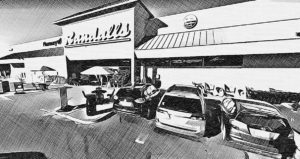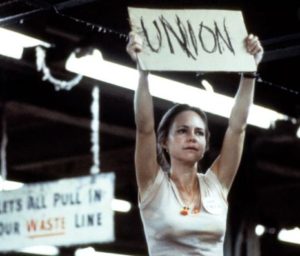I don’t think Reggie was an anti-Semite, he was just asking questions.

Reggie was a musician who did some time “for cocaine” and was on parole and working in the bakery-deli-meat market section of the Randall’s on Lake Austin Boulevard when he decided to ask my dad why in all the time he was in the penitentiary, he never met any Jews.
“Is this because y’all look out for each other? Jewish judge, jewish lawyer – you’re gonna help each other, right?”
My dad had a pained expression on his face and started slowly shaking his head like he did when he was mildly distressed. He then said something along the lines of “well, Reggie you see that’s rather problematic what you just said,” about two decades before people started saying things were problematic.
Reggie was a middle-aged black man with a moustache who wore a hairnet over a short afro. He was slender, about 6 foot 2, and looked vaguely like Richard Pryor in Live on the Sunset Strip.
Over the months that my dad and I spent working at the Randall’s on Lake Austin he and Reggie became rather fond of one another. They would crack jokes but also bicker like an old married couple. Reggie, for his part, would tease my dad some, certain in his assumption that my dad was not a former state employee, rather, he was actually a crooked lawyer who had done something dirty and ended up in white collar prison. How else could you explain why this retired 60-year-old white man was working there? And his idiot son? That didn’t make much sense either.
Mainly though, my dad was fond of Jefferson. He was a young man about 25 or 26, who had recently been paroled after serving 9 years in a state prison outside Beaumont. He never said why he was in the penitentiary, but my dad figured that if it was 9 years even with early release, and he was sent up at 17 to an adult prison, then “I’d guess there was a gun involved.” (He could have also just been wrongfully convicted)
He was broad-shouldered and had a tattoo of a naked, very well-endowed woman in a very compromising position on one of his forearms. He was also by far the hardest-working guy in the bakery-deli-meat market.
There was also Juan, a very straight-laced looking Mexican-American man in his early 30s who had been in federal prison for some time for trafficking methamphetamines. He spoke at length about the investigation against him and shook his head marveling at how “you just wouldn’t imagine how much they can get on you, once they focus on you. It was just stacks and stacks of files.”

The main thing I remember him saying though was that prison “is like a whole entire world,” and that you could learn and pick up all types of skills.
If I remember right, he told me this while we were watching a cake decorator, a young, thin black man in a white apron, write the most intricate birthday greeting on a white, round cake in looping, purple frosting letters.
I asked him where he learned how to do that, and he just said “in prison” and looked at me like I was a moron.
Randall’s, it turns out, had a program with the state of Texas where they get a tax credit or some sort of subsidy for employing parolees, typically in the meat market, deli, or bakery.
There were only two other employees in the entire department who weren’t parolees – a young man named Jonathan who was on shift with me one afternoon when he got a call that his brother had been killed in a car accident outside Llano, and the manager of the bakery, an older man named Gene. He was a very generic piss and vinegar old Texas white guy from somewhere in the country who liked to call himself “the last of the scratch bakers,” even though everything we made came frozen, including the doughnuts that arrived on a freezer truck in cardboard boxes like little frozen ninja stars.
Much of that summer remains a blur to me, and the only reason I’m writing about it now is because a friend in Austin brought it up to me and how it sounds like a sitcom or a coming of age movie. Not long after that conversation, I saw a thread on Twitter asking “what was your most sitcom type job?” I thought of the hot dog place at the student union where I worked after I graduated UT, and where I was fired for whistling (I had also refused to wear the hot dog suit and walk around campus handing out fliers), but then I remembered the summer at Randall’s and how truly strange it was.
I can’t recall how my dad got the job there, at a Randall’s on the other side of town from the one we shopped at. He did have a couple friends who lived right near the Lake Austin Boulevard Randall’s, and they liked to meet for enchiladas at Maudie’s down the street. Maybe he stopped in there one day on the way home and saw a help wanted sign and figured – rightfully – that he had the free time.
But me? It was the last summer that I was in college, I wasn’t doing much of anything else, I had no plans and either my dad or me or both of us just thought, why not? On most shifts my dad and I either worked side by side or he’d be over in the meat market or deli while I’d be in the bakery or vice versa. We’d talk all shift or pantomime from the two separate departments, eat sandwiches from the deli, and pass the time with our parolee friends. On a few occasions at the end of a shift we took cuts of filet mignon and ribeyes that were doomed to be tossed out the next morning, wrapped them, and marked them as “ground beef” and went home and ate like kings for about $2 a pound. On a couple of occasions we clocked out and headed down the street to the Deep Eddy Cabaret (it’s just a bar, not a cabaret), but my dad wasn’t a drinker, and pretty quickly both times we just looked at each other and said why don’t we go home and drink Powerade instead?
The grocery store is in a nice part of West Austin and there were a few instances when my dad and I were together at the deli or bakery counter when we saw an old acquaintance from shul, who my dad probably hadn’t seen since he and my mom divorced about 15 years earlier. I remember them looking at my dad and saying “Lee?” and him perking up and launching into a conversation like they’d just seen each other the Saturday before at kiddush, or that there’s nothing at all strange about this being how he’s spending his retirement. I also remember one extremely on-brand celebrity sighting for my father – Garry Mauro – the Democrat who ran as the sacrificial lamb in the gubernatorial race against George W. Bush a couple years before. More notably, a couple decades or so before that, he had been my father’s intern at the welfare department.
After a couple months, the summer was over, I left the job, and a few weeks later two planes crashed into the World Trade Center and a new sort of life began.
My father left a couple months after I did. He was almost 60 years old, the work was pretty physically demanding, and he’d already been injured twice – once by cutting his finger on a circular meat slicer, and once when he slipped and fell in the walk-in freezer while trying to stack boxes of frozen doughnuts. At least one box of doughnuts fell on him while he lay on the floor. Neither of these injuries were very funny at the time, but they definitely are now.
That summer job was one of many unusual but harmless things in our relationship with our father that were extremely normal to my brother and I. Like how it was normal to us that ex-girlfriends of my brother continued to live at our house even months after they’d broken up, including after he was no longer living there. Or how acquaintances or casual friends of ours became close friends of our pop, or saw him as a father figure long after they’d lost touch with us. Or how it was pretty standard stuff that an ex-girlfriend of my brother moved into our house after her apartment burned down. Or that it seemed normal to us that a man who was so giving, who was always a friend to those who had no friends, with such a great sense of humor and so much insight, could spend so much of his latter years alone.
When I covered the Alex Jones custody trial in Austin in 2017 I learned of the term “parental enmeshment,” described here as “family relationships that lack boundaries such that roles and expectations are confused.” Hearing a witness for Alex Jones’ ex-wife describe Alex’s relationship with his son as such made him seem strangely relatable. Then he took the stand later that day and talked about eating zebra steaks, smoking George Soros weed, and so on, but something of that feeling remained.
Remembering that summer job at Randall’s I think, maybe we were too close all those years, but I know being too close was better than too far. And now that he’s gone, I realize how grateful I am for the ways in which the three Hartman boys (my father, my brother and I) were unusual.
I also think a lot lately about the pandemic, and wonder how many of the essential workers at grocery stores in the US over the past year were men and women like those we worked with – invisible, put through the criminal justice system, and now putting their health at risk at perhaps one of the few jobs available to people like them.
That summer also may serve as a reminder that you should never be rude to the men or women working behind the counter at your neighborhood grocery store – it’s unkind, not cool, and you really don’t know who you’re talking to.
